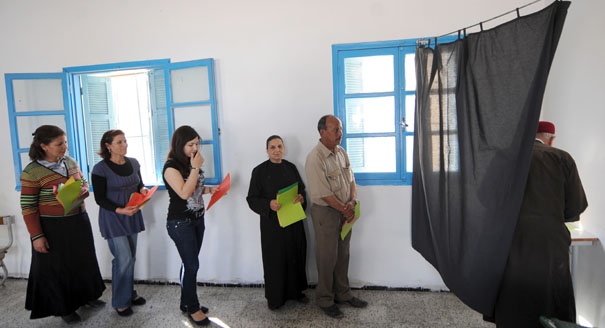On May 6, Tunisians will vote in municipal elections. The elections, which were postponed several times since 2016 for political and practical reasons, will be Tunisia’s first municipal elections, and third nationwide elections, since the 2011 uprising. Elections were held in 2011 for a constituent assembly, and in 2014 for a president and the current National Assembly.
These elections represent both an opportunity and a risk for Tunisia’s nascent democracy. If successful, they will help consolidate Tunisia’s transition to democracy and extend democratic rule to the local level. However, a low turnout or a widespread protest vote could weaken the legitimacy of the current governing structure. In either case the outcome will set the stage for Tunisia’s critical votes for president and parliament expected in 2019.
More than 2,000 electoral lists are competing for municipal offices, representing a wide range of political parties and independents. Tunisia’s 2014 constitution laid the groundwork for the decentralization of power and resources to benefit local authorities, and the municipal elections constitute an important step in that process.
Historically, political power in Tunisia has been highly centralized, reflecting the model that Tunisia maintained after independence from France in 1956. This centralization of power was further reinforced during the authoritarian rule of former president Zine al-Abidine ben Ali. Centralization has contributed to the wide imbalance in economic resources between the more developed coastal regions and the marginalized interior areas.
To address these problems, the new post-uprising constitution envisioned not only a separation of powers in the capital among legislative, executive, and judicial branches of government, but also a devolution of some powers and resources to the regions. Chapter 7 addressed local government and stipulated that “local authorities shall … manage local matters…” It also granted to local bodies the right “to manage their resources freely.” The constitution provided for a High Council of Local Authorities to represent local government bodies at the national level, especially on issues related to development and regional balance. Advocates of decentralization hope that democratically-elected local officials will be stronger advocates at the national level for resources that can alleviate the severe economic problems of the interior.
Decentralization of power in Tunisia remains somewhat controversial, however, and new legislation to define the precise prerogatives of local authorities has yet to pass in the National Assembly. Generally speaking, Nida’ Tounes, which is the second largest party in parliament, has been more skeptical about devolving real power to the regions, reflecting its base of support along the coast and among traditional elites. On the other hand, Ennahda, the Islamist party forming the largest parliamentary bloc, draws more of its support from the interior and has backed decentralization to counterbalance the traditional power bases in Tunis.
Looming in the background as Tunisians head to the polls is the debate over the economic policies of the government of Prime Minister Youssef Chahed. Slow economic growth, the falling value of the Tunisian dinar, and a recent downgrade of the country’s credit rating have undermined popular support for the government. While the government was able to weather the wave of popular anger that resulted in street demonstrations at the end of 2017 and the beginning of 2018, calls for changes in the government have continued. Most recently, Noureddine Taboubi, the head of the main labor confederation, the Tunisia General Labor Union, has demanded that Chahed reshuffle his cabinet.
Ennahda and Nida’ Tounes in particular are competing for local offices and hope to use the municipal elections to bolster their political strength ahead of the presidential and legislative elections. Ennahda in particular is seeking to solidify its influence at the grassroots level and entrench its position within Tunisia’s political system. A strong turnout in the interior could bolster Ennahda’s standing relative to Nida’ Tounes.
However, given the popular disenchantment with the economy, it is possible that Tunisians will, instead, register their unhappiness with the overall state of affairs in the country. They may blame not only the government, but also the two largest political parties, which have worked closely together on most issues over the past three years. Displeasure with the governing structure could be reflected either in a low turnout or in a large protest vote for independent candidates or smaller political parties. Recent polling by the International Republican Institute (IRI) suggests that many voters are undecided and that turnout may be low. Low turnout or a large protest vote could also have implications for the future of the Chahed government.
At a deeper level, these elections will indicate how Tunisians view the notion of decentralization, and the future of the overall decentralization process will hinge to a large degree on the strength of the turnout. If successful, these elections could also mark an inflection point where the country finally begins to deal seriously with the historic imbalance between the coast and the interior. This regional imbalance and the chronic economic and social problems in the interior pose the most serious risk to continued progress in the democratic transformation of the country. IRI polling confirms that an overwhelming majority of Tunisians describe the current economic situation as either “very bad” (68 percent) or “somewhat bad” (21 percent).
While local elections alone won’t solve these problems, they can begin a process of empowerment in the regions and reduce the alienation that many Tunisians in the interior feel. Whether this is a new beginning for the country or simply a continuation of the past will be for the Tunisian people to decide at the ballot box, starting next month.








